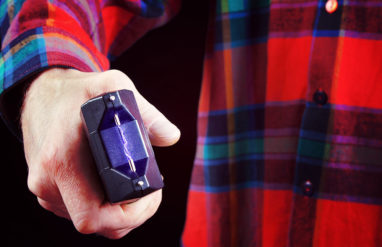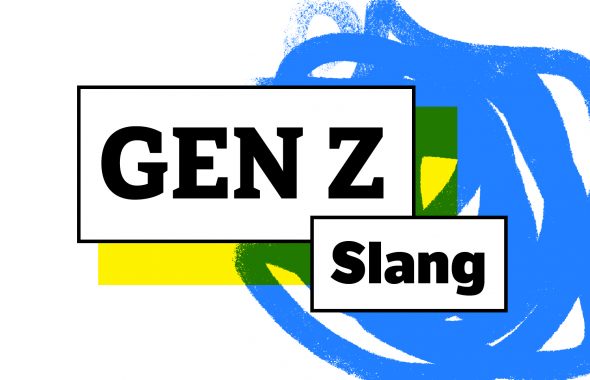Relationships are hard. And, for all its advances in the 21st century, technology hasn’t seemed to make them any easier. Internet tech, like social media, certainly has transformed not only how we date and relate from courtship of olden times, but how we talk about it as well.Swipe right? Slide into the DMs? Our great-grandparents wouldn’t even know where to start. But if they did show up Back to the Future II-style, send them our way. In this slideshow, we’re breaking down some of the latest slang terms and expressions we’re using to talk about dating and relationships in the 2010s.
Words To Help Explain Relationships In The 2010s

cuffing
Winter is long. It’s cold. It’s dreary. That’s why y’all invented cuffing.
Since the 19th century, cuffs has been short for handcuffs, but 2010s dating slang gave the term new life in getting cuffed and cuffing season. This is when someone “shacks up” with someone else during the fall and winter months—when no one wants to be alone over the holidays and yearns to cuddle up with an S.O. to escape the cold. The metaphor is of handcuffing oneself to a partner (i.e., being exclusive) during these times as opposed to being single in spring and summer, when people want to be outside playing.
The term was popularized by rapper Fabolous’s 2013 song “Cuffin Season.” Cuffing season is a popular topic on lifestyle publications each year when the leaves start changing color.

stashing
Social media has changed the dynamic of relationships in countless ways. People, for one, share lots of pics and deets about their relationships on Facebook, Tinder, and other social media. Usually.
But, have you ever been romantically involved with someone but never met any of their friends or family or have never even been featured on their social media? If so, you might be the victim of stashing, or when a partner hides (“stashes away”) another from friends and family and from their social media.
Why would anyone do this? Well, stasher reasoning includes:
- wanting to keep their options open
- being embarrassed to be seen with their partner
- viewing the partner as temporary
- concern about the reaction of friends and families based on religious or cultural differences
For the person being stashed, these may all be good reasons to … get out of the relationship. Fair warning.

ghosting
Even crueler than stashing in the social media era is ghosting. Relationship ghosting doesn’t have anything to do with spirits that go boo! No, it’s far more haunting.
You may be a victim of ghosting if, one day, you discover that the person you’ve been seeing or talking to for a few months, say, is no longer replying to your texts. The verb form is also widely used; you can date someone for a stretch and then ghost (on) them. The idea behind this term, recorded as early as 2007 but spreading around 2014, is that you’ve up and vanished, like a ghost.
With ghosting, there is no breakup conversation, perhaps because the relationship was not serious enough to warrant a formal split or because confrontation was seen as too difficult. Whatever the reason, the act of ghosting effectively ends—if disrespectfully or immaturely—a relationship. One day they’re there, the next, they’re not. Spooky. 👻

curve
What makes a person ghost? Perhaps it’s another slang term: curve. This is the whole “It’s not you, it’s me” line—when someone is into you, but you’re not really into them.
Popular culture generally speaks of two ways to curve someone. The first curving is a classic deflection (e.g., I’d love to go out, but I’m sorry, I have a boyfriend … when you don’t.) The other curving resembles leading someone on, engaging in some degree of communication with the person, but never committing to any plans or any relationship status.Curving is a useful term for the complexities of modern love, what with our many avenues of contact from Snapchat to Twitter. It’s often motivated by a desire not to hurt someone’s feelings by directly rejecting them. Because of this, however, some see curving as cowardly and misleading.

skinny love
Skinny love sounds like an expression describing when two slim people fall for each other. But, that’s not what it means—at least not according to Justin Vernon, frontman of the indie pop band Bon Iver, who helped make the phrase popular.
The 2007–08 Bon Iver album For Emma, Forever Ago included the popular track “Skinny Love.” The song is about an unhealthy, codependent relationship. In a 2011 interview with Pitchfork magazine, Vernon explained that he used the expression skinny love to describe a time in his life when “you’re in a relationship because you need help, but that’s not necessarily why you should be in a relationship. And that’s skinny. It doesn’t have weight. Skinny love doesn’t have a chance because it’s not nourished.”
The expression skinny love got a bump when it was covered by British pop star Birdy in 2011.

Tinderella
First, there was Cinderella, with her famous glass slipper. Today, there is Tinderella—an attractive person on Tinder who’s gotten away because of an accidental swipe left (rejecting a match on the dating app).Tinderella can also refer more generally to any female Tinder user, especially those who use the app religiously, perhaps to the point of obsession (although that might make her a Tinderzilla).Tinderella is largely an online phenomenon. It can refer to any woman looking for love (think “fairy-tale ending”) on Tinder or other online dating apps or women who are seen as a bit too eager for love online. It can also more generally express just how hard it is to actually meet someone on Tinder.
However, people who have had success with Tinder use the term Tinderella, too, as in, I found my Tinderella and we’re going to live happily ever after. 👰

stan & shipping
These days, its seems we are at least as obsessed with the lives of our favorite celebs and fictional characters as we are with those of the people we know. Remember Brangelina?
If you can’t get enough of these folks, you’re probably a stan. Stan is slang for a very zealous fan of a celebrity or fictional character. The act of such fandom is called stanning. One can be an Adele stan, for example, or they can stan BTS.
The term appears to be inspired by a 2000 single “Stan” by rapper Eminem. The song and video are about a young man, named Stan, who is dangerously obsessed with Eminem. Stan displays his obsession in various ways, including adopting the rapper’s look, confessing to self-harm, and recording his eventual death with the intention to send it to Eminem.Stan culture has lots of its own lingo, but they’re particularly into shipping. Shipping is the act of wanting two or more fictional characters or celebrities to end up in a relationship, usually romantic. The term ship apparently came from the X-Files fandom. Fans who wanted the characters Fox Mulder and Dana Scully to get together were called relationshippers starting in the 1990s, shortened to ship by 1996. Someone who so ships a character is a shipper (e.g., a Ron Weasley/Hermione Granger shipper in Harry Potter fandom).

if you can't handle me at my worst
Relationships have even sparked their own memes related to what we’re looking for in a romantic partner, such as if you can’t handle me at my worst … you don’t deserve me at my best. This quote is generally attributed to Marilyn Monroe, although it doesn’t have a verified source.
Regardless of the origin, in the 2000s, the if you can’t handle me at my worst quote was often seen in inspirational images and became popular on online dating profiles. Between 2009–11, these kinds of pictures circulated widely on Tumblr, so much so that by 2012, users on subreddits like r/OkCupid and r/Tinder began making fun of them.
Into the 2010s, riffs on this phrase quickly became popular on Pinterest, Tumblr, and Instagram. It became what’s known as a snowclone (e.g., X is the new Y). Here, it was If you can’t handle me at my X, you don’t deserve me at my Y.

Netflix and chill & Spotify and side hug
One of the perils of 21st-century romance is that no one seems to go on dates anymore. Instead, we find ourselves in a lull of hangouts and grabbing coffees.
A staple of the dates-that-aren’t-quite-dates is Netflix and chill. While it originally meant to literally hang out and watch the video-streaming service Netflix, in 2014 the meaning of Netflix and chill evolved to include romantically chilling with another person.
Not coincidentally, Netflix and chill also gained reputation as a bait-and-switch. People who understood the literal sense and not the slang did not realize they were being sexually propositioned until later. This led to memes in which people captioned photos or GIFs of surprised reactions with things like: I thought he meant Netflix and chill, When you find out what Netflix and chill means, and When he says Netflix and chill and you come over and he ain’t even got a TV. By 2015, it was commonly understood that Netflix and chill often meant more than just relaxing and watching a movie or show—although, perhaps ironically, by the late 2010s, Netflix and chill somewhat evolved back to its original sense, used of couples who just want to watch Netflix and chill out instead of, you know, doing other stuff.
If Netflix and chill is too intimate, you might opt for Spotify and side hug instead. Suggesting Spotify and side hug is a way to turn down someone you don’t want to hang out with or imply you just want to be friends. It’s mostly used, though, as a joking riff on Netflix and chill.
Apparently the brainchild of an Urban Dictionary submitter in 2016, the alliterative expression is meant to be a humorous step-down from Netflix and chill, as listening to music with someone on the music-streaming service Spotify, connected only by an awkward side hug, is seen as far more noncommittal.

DTR
Given how loosey-goosey so much of modern romance can seem, many of us are hankering for clarity. Are we exclusive with someone? Are we friends with benefits? Are we just chilling?
That’s where the acronym DTR comes in. It stands for define the relationship. If you’ve been going out with someone for a while, it might be time to have the DTR talk with that person, where you clarify where you stand with respect to each other and what your expectations of the relationship are.
Of course, DTR‘ing can be a make-or-break moment. That’s why some people might hold off on doing it, fearing that it might lead to the end by revealing that both people are not on the same page. No one wants to hear: “I thought we were just friends!”
No matter what new technology we have, no matter what new terms we use, one fact will never change: Relationships are hard.














